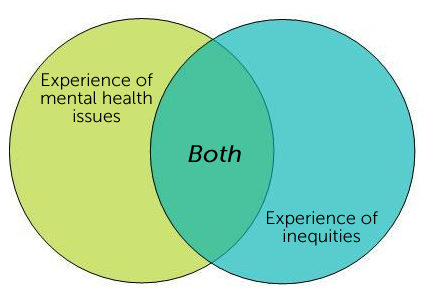It is well established that some groups (or populations) in society experience social and economic disadvantage – inequities – due to the unequal distribution of power, wealth and resources. The social determinants of health both determine and deepen inequities.
Inequities contribute to poor physical and mental health, making it difficult to access the resources needed to be, get and stay healthy (Braveman and Gruskin, 2003).
CMHA Ontario and partners identified social inclusion, freedom from discrimination and access to economic resources as the three most significant determinants of mental health in Ontario in Mental Health Promotion in Ontario: A Call To Action. All three determinants are key components of equity.
Equity issues impact mental health in important ways
Three dynamic and overlapping relationships between equity and mental health can be identified:
1. Equity matters for mental health. Due to decreased access to the social determinants of health, inequities negatively impact on the mental health of Ontarians. Marginalized groups are more likely to experience poor mental health and in some cases, mental health conditions. In addition, marginalized groups also have decreased access to the social determinants of health that are essential to recovery and positive mental health.
2. Mental health matters for equity. Poor mental health and mental health conditions have a negative impact on equity. And while mental health is a key resource for accessing the social determinants of health, historical and ongoing stigma has resulted in discrimination and social exclusion of people with lived experience of mental health issues or conditions (PWLE).
3. Equity and mental health intersect. People often experience both mental health issues and additional inequities (such as poverty, racialization, or homophobia) simultaneously. Intersectionality creates unique experiences of inequity and mental health that poses added challenges at the individual, community and health systems level.
These issues disproportionately impact three clusters of populations:
1. People with lived experience of mental health issues (PWLE).
2. People who experience marginalization related to the social determinants of health such as sexual orientation, poverty, racialization and disability.
3. PWLE who also experience additional marginalization related to the social determinants of health.

For more information, please read our discussion paper Advancing Equity in Mental Health in Ontario: Understanding Key Concepts (also available in French) and our new Equity Action Framework.